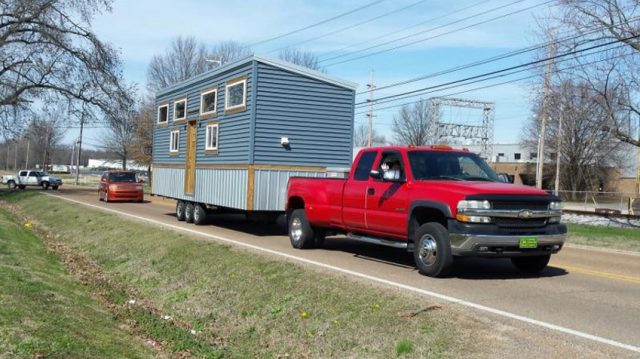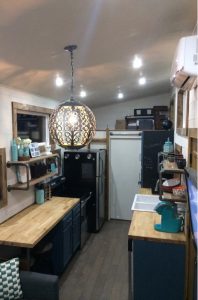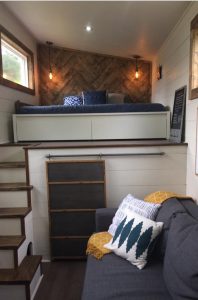
UM alumnus Derek Ezell and his family move the tiny house they built to the lot where they live in Tennessee. Building the house sparked the research for Ezell’s doctoral dissertation and has led to a peer-reviewed article in the Journal of Business Ethics. Submitted photo
OXFORD, Miss. – The rising cost of housing across north Mississippi, and around Oxford in particular, led a former University of Mississippi graduate student to seek out options, including building a so-called tiny house.
The results shaped Derek Ezell’s academic journey to a doctoral degree and led to a research paper that has gotten national attention.
Ezell, an assistant professor of marketing at the University of Tennessee at Martin, co-authored “Challenging the Good Life: An Institutional Theoretic Investigation of Consumers’ Transformational Process Toward Sustainable Living” with Victoria Bush, UM professor of marketing. The article, based on results from Ezell’s UM dissertation, was published in the Journal of Business Ethics earlier this year.
“The paper is a window on how consumers transform their living and consumption patterns in terms of tiny house living and sustainability,” Bush said. “We discovered from our interviews that downsizing to a tiny home significantly impacted owners’ financial freedom, well-being and concerns about the environment in a very positive way.”

Living in a tiny house, such as this one build by Derek Ezell and his family, requires residents to be more thoughtful in their shopping and committed to living with fewer material possessions. Submitted photo
Ezell and his wife, Sierra, originally planned to buy a house in Oxford after moving from their home in Tennessee to begin his doctoral program at UM. When the couple realized the cost of real estate in the area, they decided to build a tiny home instead.
The Ezells had seen tiny homes on television shows and the internet, and after securing financing to build one of their own, they visited an open house in Memphis to tour a variety of tiny homes in person. They designed and built their 256-square-foot modern farmhouse-meets-industrial-style home themselves, with the help of both of their fathers.
Because they built it in Tennessee, where their families live, the couple worked nights and weekends for six months to finish the project. The Ezells rented an apartment in Oxford for the three-to-four days a week that Derek taught classes.
Their personal journey led to Derek’s dissertation.
“The focus of the research was to review the impacts of sustainable and responsible consumption on well-being,” he said. “The interview pool was comprised of the tiny house community due to its inherent ties to sustainability.
“Sustainability, responsibility and well-being are major global topics with implications for the health of humanity.”
Ezell recruited 21 people from a Tiny House group on Facebook, with permission from the group administrator, and asked them a series of questions pertaining to their lifestyle. Questions ranged from “Why a tiny house?” and “How is tiny house living different?” to “How long do you intend to live this new lifestyle?”
“Overall, we found that people were forced to be more thoughtful about the purchases they make, which were less frequent due to the small amount of space to store things,” he said. “However, there was an overwhelming positivity throughout the responses as those interviewed discussed the different ways this lifestyle could be rewarding.”

The Ezell’s tiny house is designed as a 256-square-foot modern farmhouse-meets-industrial-style home. Submitted photo
The team learned some practical guidelines for living in a tiny house, Bush said. These include:
- How to shop for living in a smaller space: “Fresh and higher quality foods more often, no bulk buying; being conscious of what household items were really needed,” Bush said.
- What it feels like to get rid of a lot of material possessions. “(It’s) liberating, simplified,” she said.
- How to entertain/live in a small space. “Dining outdoors, educating folks on how to use composting toilet came up as quite a challenge,” Bush said.
- How it feels to be liberated from debt. “You have little or no mortgage, lower utility bills, freedom to experience new things and to travel,” she said.
- To be aware that tiny homes challenge the status quo when it comes to zoning, taxes, repairs, building codes and regulations.
Other Ole Miss contributors to the research are Matt Shaner, assistant professor of marketing; Scott Vitell, Phil B. Hardin Chair Emeritus of Business Ethics; and Kenny Huang, a marketing doctoral student.
“This was my first publication in JBE, and it was certainly rewarding to be a part of,” Ezell said. “This project was a small step towards discovering one of the various ways people strive to make their life better, and the Journal of Business Ethics was the perfect home for it.”